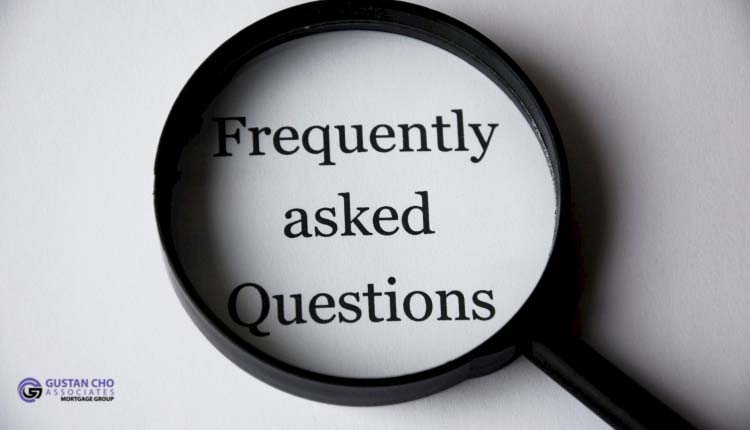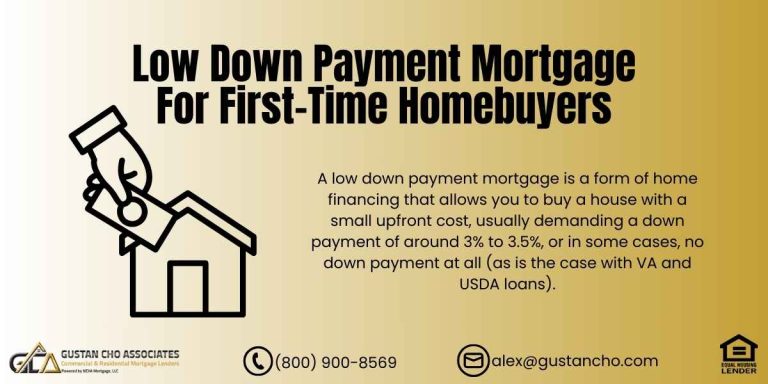Gustan Cho Associates work with many different families in all different areas of the country. But our clients commonly ask similar questions. In this blog, we will detail some of the most common questions we receive. We will also discuss how to apply for a mortgage with our highly skilled team. If you are a regular reader of our website, you will know that we help many families with less than ideal credit scores. The mortgage process can be confusing and that is why it is important to choose a mortgage team that can get you to the finish line. Buying a home is a large investment and we make sure all of our clients understand every step of the process. In the paragraphs below, we will be going over frequently asked mortgage questions by first-time homebuyers on purchase transactions and homeowners on refinances.
What Is The Minimum Credit Score Required For A Mortgage Approval?
What is the minimum credit score required by Gustan Cho Associates? This is a loaded question because the credit score requirements will vary depending on which type of mortgage you are seeking. Since the Gustan Cho Associates do not have any lender overlays, we are able to go down to the minimum qualifying credit score per agency guidelines. For our veteran clients, we do not have a minimum credit score requirement. The U.S. Department of Veterans Affairs does not have a minimum qualifying credit score for VA mortgage lending.
Which Credit Bureau Is Used By Mortgage Lenders?
Which credit bureau do you use to qualify?
Just like all mortgage companies, we require a tri-merge credit report. This means we utilize all three credit bureaus: TransUnion, Equifax, and Experian. The scoring models are the 2,5, and 4 scoring systems. To be more exact, we use TransUnion CLASSIC 04 SCORE, Equifax BEACON 5.0 SCORE, and Experian FAIR ISAAC SCORE 2. We will then utilize the minimum middle credit score. It is not an average of your credit scores, it will simply qualify off whatever score is in the middle. So, if your credit scores are 570, 605, and 628, your qualifications will be based on your 605 middle scores. For more information on credit scoring, please reach out to Mike Gracz and (800) 900-8569 or you may email mike@gustancho.com.
Buying Versus Renting Home
Should I stick to renting or should I purchase a home? We generally think if you have the ability to purchase a home, you should go ahead and pull the trigger. The housing market seems to be appreciating at a rapid pace. Experts do you think the rapid appreciation will slow down back to normal appreciation. The keyword in that sentence is appreciation.
Building Equity And Net Worth By Owning Your Own Home Versus Renting
The sooner you can enter the housing market, the more time you have for your home to go up in value. When you rent, you do not build equity in the property. We do understand there are perks to renting such as limited responsibility. That way when something major goes wrong in the house, you are not responsible, your landlord is. However, in order to build steady wealth over your lifetime, investing in real estate is considered to be one of the
safest options.
What Are The Tax Benefits of Homeownership
What are the tax benefits of homeownership? This is a question that is very important. The tax benefits of owning a home are one reason why owning a home is better than renting. There are deductions you are able to take for mortgage interest and real estate taxes paid. If you end up paying discount points to purchase a home, that amount is also a tax deduction. As a first-time homebuyer, you do not need to worry about capital gains assuming you live in the house for two or more years. As your income starts to increase, tax deductions are more and more important.
How Long Do I Need To Stay In The Home I Buy To Make It Worth While
Planning ahead comes with many questions. A common question we were asked is how long do I need to stay in the home to make it worth it? This is a difficult question to answer because everybody’s situation is different. However, if you plan to stay in the home for five years or more, we strongly suggest buying over renting. If you may not stay in the home for five years, and you have the ability to rent the home after moving out, we strongly encourage you to buy. If you know you’re only going to be in an area for one to two years, buying the home might not be the best idea. The reason is, you do pay closing costs when you sell a property. You must pay realtors and title fees as well as any property taxes due. Unless you put down a large down payment, you may not be able to sell without losing money. Again, planning ahead is very important when making a major life decision.
Can I Have Unpaid Collection Accounts To Qualify For A Mortgage?
I have collection and charged-off accounts on my credit, can I still get a mortgage? The answer to this question is yes. Gustan Cho Associates work with many borrowers who have collection accounts. We even work with individuals who have numerous collection accounts. The general rule of thumb surrounding collections is as follows. The collection must be at least 12 months old or greater. Assuming the collection is over 12 months old, 5% of the total balance will be used as a monthly payment. So, let’s say you have a collection for $2,432. In this scenario, your lender will use $121.60 against your debt-to-income ratio (5% of $2,432). There are situations where it does not make sense to pay a collection. Sometimes when you pay a collection, it can negatively impact your credit score. We know that sounds backward, for any questions surrounding collections (or any other derogatory credit, please reach out to our team. You can reach Mike Gracz directly on (800) 900-8569 or via email at mike@gustancho.com.
What Should I Expect During The Home Buying Process As A First-Time Homebuyer?
Gustan Cho Associates specialize in working with first-time homebuyers. We understand how daunting the process can sound. It is our job to make this process as seamless as possible for you. The process will start with a one on one mortgage consultation with one of our licensed loan officers. From there you will apply with our team (or one of our affiliate partners depending on where you are located). After you fill out your application, you will send in some basic income and asset documentation. Your loan officer will then reverse engineer the numbers based on your assets available, yearly income provided from pay stubs, W-2s (and sometimes tax returns), and your credit profile.
Shopping For A Home To Buy After Being Pre-Approved
Once you are issued a preapproval letter, the house hunting starts. This is the fun part! You and your realtor will find the home of your dreams and then put in an offer. Once your offer is accepted, Gustan Cho Associates will walk you through every step of the process from start to finish. Our team is trained to help answer any questions you or your realtor may have during the entire process. As mentioned above, we work with many first-time homebuyers and will keep you educated on every step of the process.
How Do I Find Out How Much Home I Can Afford?
In order to find out how much home you can afford, you will reach out to our team and start the preapproval process. Just because a guideline says you can afford a $2800 mortgage payment, that does not mean that is the best decision for you. Gustan Cho Associates do not have any lender overlays surrounding debt-to-income ratios, but we want to make sure our clients are comfortable with their monthly payments. Agency guidelines are put in place to protect people from buying homes they cannot afford.
The Ability To Repay My New Mortgage Payment
Every mortgage loan must pass the “ATR rule” which stands for the ability to repay. Just because the guidelines say you can afford a certain payment, this does not mean you need to go all the way up to that amount. Most importantly, our team is trained to ask you questions about your monthly budget. We want to make sure you obtain a home with a monthly payment that is comfortable now and more importantly a comfortable monthly payment into the future. When owning a home, it is important to prepare for the unexpected. A homeowner insurance deductible typically starts at $1000, a substantial chunk of change. As a homeowner, we want to make sure you don’t use all of your available assets to purchase a home.
What Is Mortgage Insurance?
The majority of first-time homebuyers will be paying mortgage insurance. Many borrowers will pay upfront mortgage insurance. Now you may be asking what is mortgage insurance? Mortgage insurance is a tool used to protect the lender when a homebuyer does not have a 20% down payment. The majority of first-
time home buyers do not put down 20%. That being said, mortgage insurance will protect the gap between 80% loan-to-value (LTV) and your down payment amount for the lender. Mortgage insurance is different from homeowners insurance. This is critical.
Get qualified for a mortgage today!!!
What Does Protection Do Homeowners Insurance Cover
Homeowners insurance will protect you if something goes wrong with your properties such as a fire or physical damage. Once again, mortgage insurance is only there to protect the lender. Paying mortgage insurance allows most first-time homebuyers to enter the housing market because they do not require a 20% down payment. Let’s go over mortgage insurance for FHA mortgage lending.
FHA Mortgage Insurance Premium
FHA mortgage lending has a standard 1.75% upfront mortgage insurance premium and then a monthly mortgage insurance premium of 85 basis points. If you put down 5% or greater, your mortgage insurance is then only 80 basis points on a monthly basis. We understand these terms may be confusing, please call our team for any clarification questions.
Frequently Asked Mortgage Questions: Will My Payment Change After I Buy A Home?
This is a great question and comes up quite frequently. The majority of mortgage programs offered today are fixed-rate mortgage loans. Meaning your principal and interest payment will be the same for all payments made on your mortgage. But that does not mean your monthly payment cannot change. Most first-time homebuyers are required to pay their taxes and insurance through their monthly mortgage payment but using an escrow account. Each month, your lender will collect 1/12 of your tax bill and 1/12 of your total homeowners’ insurance premium. This way when you make your 12 monthly payments each year, there will be enough money in your escrow account to pay your property taxes and insurance when they are due next.
Mortgage Escrow Required By Lenders
If your property tax rate is out of your control, your monthly payment can increase. If you decide to take out more insurance coverage or your insurance premium goes up, your monthly payment will go up slightly. Your payment will be steadier compared to renting. If you have been renting for numerous years, I’m sure you have felt the increase in rents over the past 12 months. Rents have increased at an alarming rate in the past 12 calendar months. In some cities such as Miami, rents have gone up by an average of 30%. If you were locked into a 30 year fixed mortgage, your payment would not increase anywhere near that amount. This will help you prepare for future purchases and family planning.
For any mortgage questions not discussed in this article, please call Gustan Cho Associates today. We strive to make ourselves available on nights and weekends to accommodate our clients. We are experts in mortgage lending and would love the opportunity to answer any questions you may have. As
we enter 2022, our team will continue to update you on any guideline changes. Take a look at our reviews and give us a call today!
Get qualified for a mortgage today by clicking on this link!!!









